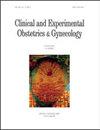胎儿复杂拷贝数变异的产前诊断和父母相关的细胞遗传学发现
IF 0.6
4区 医学
Q4 OBSTETRICS & GYNECOLOGY
引用次数: 0
摘要
背景:复杂拷贝数变异(CNVs)的共同出现与已知综合征更严重的临床表现相关。很少有研究讨论多克隆胎儿的诊断和遗传咨询。本队列研究旨在总结通过产前诊断确定的复杂拷贝数变异的发现以及亲本研究的结果。方法:选取2746例孕妇,根据不同临床适应症采用染色体微阵列分析(CMA)进行诊断。共有12例胎儿被诊断为复杂CNVs(胎儿同时被鉴定为两个或多个CNVs)。根据胎儿不平衡的大小和方法分辨率,采用CMA、g波段核型分析和全基因组低覆盖率配对测序(WGL-MPS)进行亲本分析。结果:在我们的队列中,携带复杂CNVs的胎儿占0.4%(12/2746)。在患者同意的情况下,对12例复杂CNVs病例中的8例进行了亲代验证研究。初步结果表明,62.5%(5 / 8)的复杂CNVs胎儿来自亲本遗传。在这些病例中,5个中有4个来自母亲或父亲的平衡易位携带者。在平衡易位携带者家族中发现复发性自然流产。结论:在本研究中,检测到复杂CNVs的胎儿中有4/8遗传自父母平衡易位。当发现胎儿复杂的基因拷贝数变异时,考虑到父母平衡重排的风险,未来怀孕的遗传咨询可能对这些家庭有用。本文章由计算机程序翻译,如有差异,请以英文原文为准。
Prenatal Diagnosis of Complex Copy Number Variants in the Fetus and Associated Cytogenetic Findings in Parents
Background: Co-occurrence of complex copy number variants (CNVs) is associated with more severe clinical expressivity of known syndromes. Few studies discuss diagnosis and genetic counseling for fetuses identified with multiple CNVs. This cohort study aims to summarize findings of complex copy number variants identified via prenatal diagnosis along with the results of parental studies. Methods: 2746 pregnant women were included and diagnosed by chromosomal microarray analysis (CMA) according to different clinical indications. A total of 12 fetuses were diagnosed with complex CNVs (a fetus identified with two or more CNVs simultaneously). Parental analysis was performed by CMA, G-band karyotype analysis, and whole-genome low-coverage mate-pair sequencing (WGL-MPS) based on the size of the fetal imbalances and method resolution. Results: Fetuses carrying complex CNVs were identified as being 0.4% (12/2746) in our cohort. The parental validation study was performed in 8 of 12 complex CNVs cases with the permission of the patients. The primary results suggested that 62.5% (5 out of 8) of fetuses with complex CNVs were from parental inheritance. In these cases, 4 out of 5 were derived from maternal or paternal balanced translocation carriers. Recurrent spontaneous abortion was found in balanced translocation carrier family. Conclusion: In this study, in 4/8 of the fetuses detected with complex CNVs was inherited from a parental balanced translocation. Given the risk of parental balanced rearrangements when fetal complex CNVs are identified, genetic counseling for future pregnancies may be useful for these families.
求助全文
通过发布文献求助,成功后即可免费获取论文全文。
去求助
来源期刊
CiteScore
0.50
自引率
0.00%
发文量
241
审稿时长
1 months
期刊介绍:
CEOG is an international, peer-reviewed, open access journal. CEOG covers all aspects of Obstetrics and Gynecology, including obstetrics, prenatal diagnosis, maternal-fetal medicine, perinatology, general gynecology, gynecologic oncology, uro-gynecology, reproductive medicine, infertility, reproductive endocrinology, sexual medicine. All submissions of cutting-edge advances of medical research in the area of women''s health worldwide are encouraged.

 求助内容:
求助内容: 应助结果提醒方式:
应助结果提醒方式:


